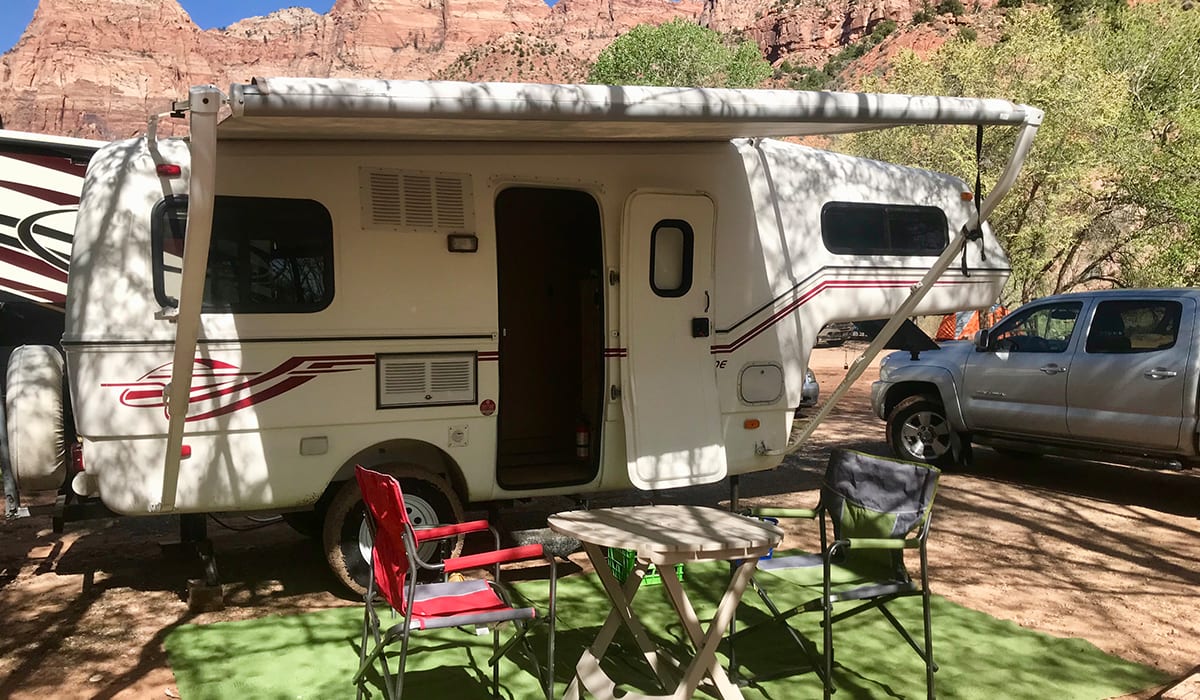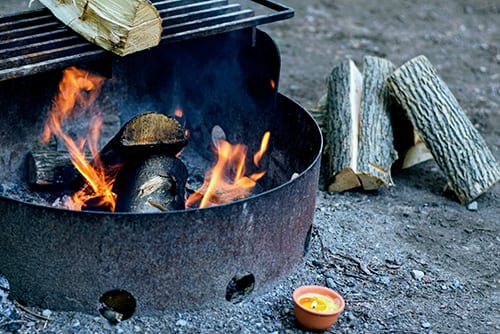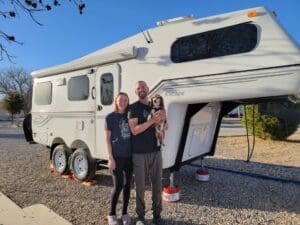7 Natural Ways to Keep Bugs at Bay
Traveling in your RV across the country can be liberating. Your RV is a conduit for bigger things, like exploring the great outdoors. When you hit the road, you will be spending more time outside than you would at home. And what will you find outside more often than not? Pests ready to drive you back indoors.
Luckily, with a little planning and some simple and natural solutions, you can keep the bugs at bay. If you’re looking for a natural way to prevent ants, chiggers, fleas, flies, mosquitos, and ticks, here are our favorite solutions.

1. Choose where to camp carefully
Picking the right spot to camp can make a big difference when it comes to pesky bugs bothering you. When picking a place to set up camp, follow these guidelines to reduce bugs:
Find a site that is open (free of shrubs and mostly free of trees) so that you can get a good breeze–that will help control some of the flying pests.
Avoid tall grass. Grasses harbor many insect species from chiggers to ticks. The farther away you are, the farther they will have to go to find you.
Last, look for a spot where there is little or no standing water. Mosquitos breed in water, so if you can avoid wet habitats, you will have fewer mosquitoes bothering you.
2. Keep your campsite clean
Messy campsites can increase and attract flies and ants. Leftover food, paper plates, and cooking trash is often the worst culprit when it comes to attracting bugs.
Do your best to keep your campsite free of garbage by
- Keeping all garbage bags tightly sealed.
- Dispose of trash properly as often as you can.
- Keeping an eye on the kids as they snack. If they drop large pieces of food–like a quarter of a granola bar–try to pick it up and get it into the trash.
- Don’t leave cooking items out overnight.

3. Wear clothes that shield your skin from bugs
Clothing can make a major difference when it comes to bugs ruining your time in the wilderness.
If the weather allows, wear long sleeves and pants. They will give you a layer of fabric that bugs will struggle to bite through. Pants are especially important to prevent ticks and chiggers from getting to your skin. Tuck the bottom of your pant legs into your sock to reduce access points to your skin.
Believe it or not, color can make a difference. Mosquitoes are attracted to various shades of blue. Try to wear browns and greens which are their least favorite colors.
While we’re on the topic of scent, fragranced creams and salves can attract bugs as well. Avoid anything with a perfumed fragrance, and you will find that few bugs find you.
While not as “natural” as other methods, pretreating your clothing with Permethrin for extreme circumstances will prevent bugs from making a meal of you. Permethrin is a better option than spraying bug spray directly on your skin. It is also preferable to using Deet.
4. Outfit your RV to be bug-free
Your evenings on the road will become a lot more relaxing if you don’t have to battle the bugs as they bite you. To make your travel trailer a bug-free zone, try some of these strategies:
Burning sage is a great way to keep mosquitoes away–make a small fire on the ground or in a tabletop grill, and toss some in. The smoke from the sage will keep mosquitos at bay. You can do the same with rosemary, eucalyptus, and mint.

Add a couple of solar electric bug zappers to the exterior of your RV. Hang them up and let them go to work. Bug zappers are simple and effective.
Eating and relaxing inside a screened tent is also a good idea. There might be plenty of annoying pests around, but they will be on the outside, and you will be enjoying the inside.
5. Create your own naturally safe bug sprays
It is both inexpensive and easy to make sprays that repel mosquitos, fleas, and ants.
One DIY fabric bug spray for mosquitoes is a simple apple cider vinegar spritz. Just put cider vinegar into a spray bottle and spray your screen door or your tent door. You can also spray it on your clothing and skin, but you might not like the smell. (Lemon eucalyptus is also effective as a fabric spray).
For direct skin use, you can make a spray from 2 teaspoons of lemon eucalyptus oil mixed with a quart of water. Pour it into a spray bottle, shake, then spray.
Two other methods involve onions and garlic. Rubbing onion juice (or leftover peels) on your skin can prevent mosquitoes from biting you, but the smell can be a little off-putting. You can also try taking garlic capsules. That will prevent mosquitoes from attacking away without the strong smell.
One technique that might smell a bit sweeter is citrus and mint. Rub citrus peels on your skin, use minty mouthwash, or keep potted mint plants around your campsite.
6. Use herbs & essential oils to keep pests at-bay
If you’re a fan of essential oils or looking for additional ways to use your herbs, bring them along on your trip to create your own aromatic bug barriers.
Cedar oil is one of the most effective essential oils for bug deterrence. It works well to repel a variety of insects, just mix it with alcohol, and spray it on.
There are many other essential oils that can repel bugs as well. Try one of the following:
- Cedarwood
- Eucalyptus
- Basil
- Citronella
- Clove
- Rosemary
- Lavender
- Mint
- Pennyroyal
- Peppermint
- Rosemary
- Sage
- Thyme
When making your essential oil bug spray, use 10 to 20 drops of the essential oil, and mix it with 4 ounces of water (½ cup). Pour it into a spray bottle, shake and spray.
For ticks, mix 30 drops of oil of lemon eucalyptus with 4 ounces of apple cider vinegar.

7. Create a bug shield around your campsite
Citronella Candles
Citronella candles work well inside your RV, but tend to be ineffective outside where the breeze moves the air around quite a bit.
Diatomaceous Earth
One of the best natural solutions to pests is diatomaceous earth. What is that? It is simply the remains of ancient diatoms that were in the ocean millions of years ago. When they died, their microscopic shells formed a layer of sediment. Today, it is mined, crushed into a powder, and sold. It is environmentally safe, easy to use, and effective against a variety of bugs.
It works well against:
- Ants
- Bed bugs
- Chiggers
- Ticks
All you have to do is spread the powder around your campsite. You can buy a hand spreader or make one out of a small coffee can with a rubber lid. Just punch holes in the lid, add the diatomaceous earth, turn upside down and shake.
For fleas and ants, you can also mix a tablespoon of dish soap with a gallon of water, then spray it around your RV or your campsite.
A bowl of cider vinegar in a bowl will attract flies, but when they land, they won’t be able to fly off and drown.
Bug-free and ready to enjoy the life on the road
Ridding your campsite of pests doesn’t need to be expensive or difficult. More importantly, it doesn’t need to involve harmful chemicals. Try some of the remedies and you won’t have to worry about bugs buzzing past your ear as you listen to the sound of nature. We hope you enjoy your bug-free camping.
Looking to go greener on your RV adventure? Try these simple ways to save water.
To receive our newsletter by e-mail, please click the “Subscribe” button in the footer below.












